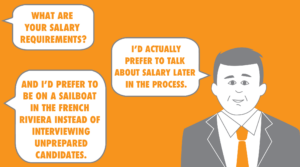 If you pay attention to entertainment news, you’re well aware that Hollywood is gearing up for another thrilling television and film awards season. But if you’re anything like us, you’ve only seen a fraction of nominated films up for the big, buzz-worthy, awards and also much prefer the good-natured fun of the Golden Raspberry (aka Razzie) awards, which are given out to the worst movies/actors of the year.
If you pay attention to entertainment news, you’re well aware that Hollywood is gearing up for another thrilling television and film awards season. But if you’re anything like us, you’ve only seen a fraction of nominated films up for the big, buzz-worthy, awards and also much prefer the good-natured fun of the Golden Raspberry (aka Razzie) awards, which are given out to the worst movies/actors of the year.
So while we’re not qualified to comment on who should end up taking home Best Actor (obviously Cillian Murphy), the time we spend reviewing thousands of job applications every year does make us a good source for judging the best from the worst on the resume front.
With that in mind, we’ve gathered our top tips to create an Oscar-worthy resume and the mistakes that are more likely to end you up on the shortlist for a Razzie.
(This is the first of a two-part series.)
- Oscar-worthy editing: Great films present their plots concisely and compellingly. Similarly, your résumé should be one page, maybe 2, with very few exceptions. Unlike diehard Zack Snyder fans, hiring managers aren’t likely to stick around for the Director’s Cut version of your career and you don’t want your critical skills buried on a third page! Tip: if you’re having trouble trimming down your resume, ask yourself, “What is most relevant to the specific job I’m applying for?” If it isn’t going to help you land that job, cut it.
- Razzie-worthy trailer: We’ve all seen eye-roll-worthy bad movie trailers. The type full of cheesy lines and poorly executed special effects. Even for a great movie, a terrible trailer can convince an audience to skip the main event. A summary/objective section is the resume equivalent to a bad trailer. Surely your objective is getting the job that you’ve applied for? And, a résumé itself is already a summary of your experience! Without hesitation, we can tell you this is our least favorite section of the résumé. It’s the area where otherwise sane people are drawn to use jargon, B.S., wild hyperbole, and annoying buzzwords like “synergy.” Whatever it is you want to say here, invest in including it in an Oscar-worthy cover letter instead.
- Oscar-worthy screenplay: In scriptwriting, structure is everything. A story that jumps around can easily lose its audience, just like a resume that doesn’t follow a logical order. To gain that clarity in your resume, you must use clear, uniform dates. Include your start and end dates, preferably with months, to delineate exactly how much time you spent at each role. This information is extremely important for hiring managers to understand your experience. Further, leaving out dates is conspicuous and does far more harm than good. And while we’re at it, please make it chronological!
- Razzie-worthy plot holes: We’ve all seen movies where the plot twist feels forced or unclear, leaving the audience more confused than impressed (looking at you, M. Night Shyamalan). The same goes for resumes with overlapping or ambiguous roles. If you’ve juggled multiple jobs simultaneously, be upfront about the nature of each position—whether it’s a contract, consulting gig, or part-time work. Clarity is critical; you don’t want hiring managers guessing about your storyline or suspecting you of embellishing your role. Transparency turns what could be a plot hole into a compelling part of your narrative.
- Oscar-worthy lead actress: It’s a good thing Oscar-bait movies usually feature the lead cast’s names prominently in both the opening and closing credits – how else would The Academy know where to send their invites? Similarly, your resume must include your (accurate) contact information. This should seem Captain Obvious, but just recently we had a candidate apply with a résumé that lacked contact information. Worse, this person also mistyped their email on the application form. This means we quite literally can’t contact the candidate! And we hate to imagine that she’ll miss out on her opportunity to deliver a memorable (job) acceptance speech because of it.
Speaking of speeches, we can hear the opening notes of the house band playing us off the stage, so we’ll end here for this month. We encourage you to use these points to brush up your résumé and then come back next month for the rest of our tips.
While we can’t promise you’ll end up taking home a golden statue (or in this case, a job) at the end of the night, these tips should help you avoid ending up with an invitation to the Razzies.









